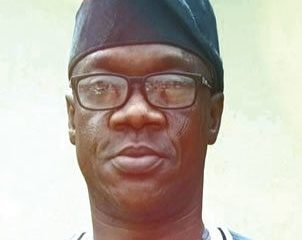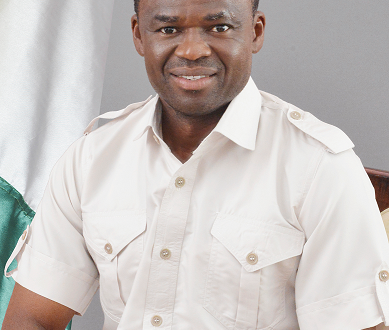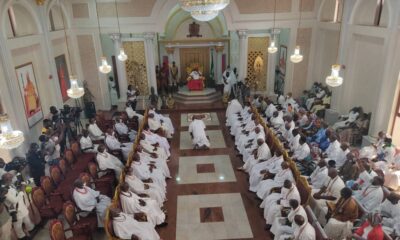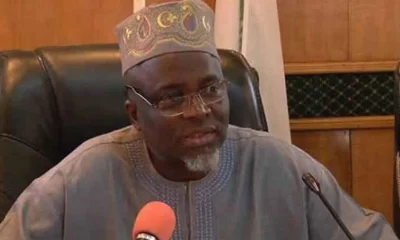Opinion
2023: Remembering Lagos’ Late Labour Leader [OPINION]
Published
1 year agoon
By
Editor
By Suyi Ayodele
On his death bed in 2009, when Bola Ahmed Tinubu visited him, the late human rights activist and lawyer, Chief Gani Fawehinmi, pleaded with Tinubu to “forgive” Ayodele Akele and “assist” him by talking to his liegeman, who was the governor of Lagos State then, Raji Fashola, to pay Akele his entitlements. That plea of a dying man was rebuffed. Akele died on June 23, 2020, a poor man. In 2002, Akele led the workers in the employ of the Lagos State Government to protest the refusal of the Bola Ahmed Tinubu administration to pay the minimum wage of N7,500 recommended by the Federal Government. Tinubu would not have any of that. Without warning, in an executive tyranny couched in the euphemistic phrase, “work force rationalisation”, Tinubu sacked over 10,00 workers. Akele was one of them. After many entreaties, Tinubu had a change of mind and recalled some of the workers. But Akele and some other leaders were not called back. His entitlements were never paid.
On Monday, December 19, 2022, Tinubu met with the Nigerian Labour leaders at Chida Hotel Conference Centre in Abuja, where he told the Organised Labour that he is one of them in the fight for good governance. Labour leaders from the Nigerian Labour Congress (NLC) and Trade Union Congress led by Ayuba Wabba, and Festus Osifo, respectfully, attended the Townhall meeting. Tinubu spoke about his love for the Nigerian workers at the meeting and Wabba, and Osifo clapped. I shook my head. You clap only when you approve of a thing. Clapping for Tinubu, when he claimed to be on the same page with the Nigerian workers in their struggle for good governance, means that Wabba and Osifo believed and still believe that Tinubu is a true lover of the Nigerian workers. Yet our elders say two people do not lose out in a game of lies. How come that reverse is the case here? Among other things, Tinubu told the leadership of the Nigerian workers that he would make fiscal monetary policies work for the workers and the two Labour leaders beamed with joy. Ha! The APC presidential candidate said: “My Action Plan for a Better Nigeria sets out a vision of opportunity, social justice and prosperity for all. I seek a Nigeria where sufficient jobs with decent wages give people the chance to live better lives”, and nobody contradicted him among the “Comrades”, who listened to him talk.
FROM THE AUTHOR: OPINION: They Have Killed Her!
All Akele’s labour of life was withheld by the now ‘workers-friendly” Tinubu and yet, those who should know better clapped when Tinubu said he would give the Nigerian workers “decent wage”! What has really changed in Tinubu that would make anyone to believe his Sermon on the Mountain of a better deal for the Nigerian workers under his presidency? How many times has Tinubu spoken for the Nigerian workers since the beginning of the General Muhammadu Buhari administration in 2015? Can anyone, dead or alive, give us a quotable quote of Tinubu on the recent eight-month strike action by the Academic Staff Union of Universities (ASUU)? What has he said about the unpaid, but earned, eight-month salaries of the university’s teachers? Or, in the reckoning of Wabba and Osifo, are members of ASUU not Nigerian workers?
The wise woman of Pakude, an ancient, but extinct town, says a woman can only be deceived once to go for a romp in a cocoyam barn because it was described to her as a mansion. On a second trip, if she fails to recognise the landmarks on the way leading to the barn, then she should be regarded as not only adulterous, but equally foolish. The ruining All Progressive Congress has succeeded in taking the Nigerian masses twice to its cocoyam barn. The people have their numerous tales of woes to talk about the two flirtatious relationships. The worst hit are the Nigerian workers, whose take home pays cannot take them home. Another season of amorous relationships is in the offing. Now the party and its presidential candidate, Bola Ahmed Tinubu, are back at their trade again. APC, through Tinubu, is singing new lyrics of love songs to the Nigerian workers again. Will Nigerian workers dance to the love song and allow thunder to strike them on the same spot for the third time? The answer is theirs to provide.
Every work of art, written or oral, mirrors life. A good work of art, literary critics say, must imbibe the principle of verisimilitude (a true to life scenario). Writers, from ages immemorial, try to ensure that what they produce is something that creates a déjà vu feeling in the reader, and, or audience, as the case may be. Nigeria is at another political crossroads as the 2023 general elections get closer. The scenes being played to us by those angling to be our ruler come May 2023 give us a feeling that we have seen it before. Nothing new; nothing has changed and more importantly, nothing will ever change. Dark Rum, a spirit drink introduced to the Nigerian market early this millennium, has its creative line as: “Seen 99, Not afraid of 100”. That is exactly our situation. Nigerians have seen the worst of political shenanigans; nothing moves us again! If Nigeria were to be a work of literature, the character that best describes our present situation is Bathsheba Everdene, the heroine fictional character in “Far From the Madding Crowd”, the 1874 pastoral novel by Thomas Hardy. Bathsheba, a farm owner and beautiful lady ripe for marriage, is caught in the love webs of three suitors, namely: Gabriel Oak (a hilarious and generous herder), Sergeant Francis Troy (a young, but abusive and egotistical soldier) and William Boldwood (who owns the next farm to Bathsheba’s). The three suitors are a combination of honest, unscrupulous and manipulative love, thus leaving Bathsheba in a fix. Eventually, the female farmer marries the abusive Sergeant Troy, whom, Hardy, introduces to us in chapter 25 (page 130) thus: “IDIOSYNCRASY and vicissitude had combined to stamp Sergeant Troy as an exceptional being. He was a man to whom memories were an incumbrance, and anticipations a superfluity”.
FROM THE AUTHOR: OPINION: Charity Begins At Chatham
My mind raced to Hardy and his description of Sergeant Troy as Wabba and Osifo clapped for Tinubu. I asked myself, is it a fact that “memories were an incumbrance”? I checked if the Tinubu, who spoke at the Abuja Townhall meeting with the Organised Labour is the same Tinubu who ruled Lagos State as its governor between 1999 and 2007 and I answered in the affirmative. Then, what do the Nigerian politicians take the masses for? People without memories or what? Of all perfidies, how on earth would a Tinubu come before the leadership of the Nigerian workers to talk about his love for workers and his plan to give the Organised Labour “decent wage”? When he was talking, where did Wabba and Osifo put the late Akele, who died barely two and half years ago? I shook my head again. I wondered how the duo of Wabba, and Osifo would not allow the concrete slab on Akele’s grave to set before they sell those Akele lived and died for to the man, whose action led to the untimely death of the very best of the nation’s Organised Labour.
The Socialist Labour, a pressure group with the nation’s Organised Labour, appears to understand Tinubu and his congenital hatred for the Nigerian workers more than the labour leaders, who were at the Abuja meeting with the APC presidential candidate. Almost immediately after the Abuja dadakuada (non-rhythmic dance), the group issued a statement, warning the Nigerian workers against supporting Tinubu’s presidential ambition. The group, in a statement endorsed by its National Secretary, Biodun Olamosu, said Tinubu had never been a friend of the workers. The statement mentioned how Tinubu sacked over 10,000 Lagos State workers over their protest against the refusal of the Tinubu-led administration to pay the N7, 500 minimum wage approved by the Federal Government in 2002. The group also recalled the ugly fate of the 300 out of 375 workers in Tinubu’s, Alpha Beta company, sacked because they opted to join the Association of Senior Staff of Bank and Financial Institutions (ASSBIFI). It added that “Two years later, in June 2017, 145 staff were retrenched from Tinubu’s television station, TVC”. Then it concluded: “Handing Tinubu a copy of the NLC’s Charter of Workers Demands at a friendly meeting in the presence of Oshiomhole and other turncoats, is not going to change Tinubu’s habits spanning his adult life. The NLC and the TUC should be preparing to fight the next President, whoever they turn out to be, rather than cosying up to them”.
For those who may want to argue what is wrong, if indeed, Tinubu sacked workers from his two companies: Alpha Beta and the TVC, I have this to say. For whatever reason, the Nigerian labour law is tilted towards the employer rather than the employee, especially in the private sector. Yours sincerely worked in a supposedly blue-chip company for 16 solid years. When the owner decided to ship me out alongside eight others, it was a mere phone call from Human Resources and a sad two-month salary in lieu of notice that he needed. Nothing more, nothing less. Options were open to challenge that slavish tendency in court, but I opted for peace. There are battles one needs to leave for the gods. No excuse was given for booting us out and no infraction was levelled against us. The lesson learnt is that most Nigerian corporate bodies lack corporate governance. Big companies are run on the whims and caprices of their owners. The regulatory bodies too are either handicapped or heavily compromised. The axiom in that mad contraption called corporate employment remains largely: “You cannot force a willing slave on an unwilling master”. Too bad! But it is not so with the civil service. There are rules and regulations governing the civil service. The General Order is the Bible in that sector. Once engaged, it takes a lot to sack an ordinary Gardener in the civil service. Only tyrants in Government House as governors wake up to off load over 10,000 workers because they asked to be paid a living wage. Tinubu once did that, and the leader of the sacked workers went to his grave penniless!
FROM THE AUTHOR: OPINION: The Unelected Powerful First Ladies Of Nigeria
General Buhari is getting away with his maltreatment of ASUU because we are largely docile as a people. It is sheer ignorance for either the president, or the Minister of Education, Adamu Adamu, or the two ministers in the Ministry of Labour and Employment; Chris Ngige and Festus Keyamo, to think that while on strike, academic staff in the universities don’t do anything. Such thinking is not only uneducated, largely, but equally silly and irrational. Being a lecturer in a university goes beyond holding the chalk to teach. Nigeria has just postponed the evil days. My mind tells me that one day, monkey go go market and he no go return. Those withheld eight-month salaries will be paid! And this is why the Nigerian Organised Labour should be wary of who it flirts with among the hodgepodges jostling to lead us come 2023. While it is true, as we say in street lingo that “there is no good among piglets”, it is equally unwise to think that an old dog can be taught new tricks. Leopards, we are told, cannot change their spots. Tinubu’s new love for the workers is suspect as his antecedents in power do not tally with what he is proclaiming now. Believing him is tantamount to being led the third time to a cocoyam barn. But, in all, Hardy’s words remain evergreen: “Memories were an incumbrance, and anticipations a superfluity”. Merry Christmas and a prosperous new year.
You may like

By Suyi Ayodele
We were in Abuja on an official assignment; one of the entertainment engagements of Globacom then. The phone rang. The leader of the team, a Director in the Marketing Communications Department, looked at all of us sitting at the table, brainstorming on the evening’s assignment. We got the message. The Big Man was at the other end. Silence! We could hear the voice from the other end, though the phone was not on speaker. “Awe o, we need you to be in Johannesburg this evening or first flight tomorrow. Do you have a South African visa?” Our Director responded: “No sir.” “Ok”. The line went off and we resumed our talk.
A few minutes later, the phone rang again and the Director jumped up, picking the phone and moving away from us. We were by the pool side of the hotel. I prayed silently that our boss would not fall inside the pool. He was just nodding his head, with intermittent “Yes sir”; “Mo ngbo yin sir”- I can hear you sir. The call ended and the Director returned to our table. “I need to take my passport in the room. Suyi, tell Tosin (one of the drivers attached to the project) to get the Hilux. We are going to the South African Embassy”, he announced. Minutes later, we were on our way to the embassy. I asked our boss what was in the offing. He responded: “Baba said someone will be waiting at the embassy.”
To cut the long story short, we got to the embassy, and we met a woman waiting for us. We were ushered in and the Director was taken into an inner office. Half an hour later, he came to join me at the waiting room. I asked him again (curiosity won’t kill my cat sha): “Are you getting the visa, today?” He answered that he was asked to wait. We didn’t have to wait long. A young man stepped out of one of the offices and asked our Director to follow him. A few minutes later, the man came out of the office and beckoned on me. In the car, he showed me his passport with the visa approval. Wao! Then, the director sent a message to the Big Man thus: “Thank you sir. I got the visa. Agba yin a dale -may you live long- sir.” The simple response from the Big Man reads: “That is why I am the Chairman. My name opens the door for you.” God, I must be a big man!
FROM THE AUTHOR: OPINION: Onitiri-Abiola And The Madness In Ibadan
Age grades are in three categories in my native place. The first set is known as “Boranje”, which literally means those who don’t give a damn about the consequences of their actions. They have the energy and they represent the restive segment of the society. Those in this category are materials for recruitment into the community’s army. The middle class is the Elekurupa. They are the moderates. They fill the gap between the first and the last categories. They are the intermediate class. The last group are those we call Agba Ule – Council of Elders. This categorisation is at the family level. They are the elders. Their first selling point is their wisdom. Whatever the Elekurupa cannot resolve, the Agba Ule class handles. They only refer very knotty issues to the Agba Ulu- council of community elders. Agba Ulu is presided over by the oba of the town. Incidentally, most Agba Ule are also members of Agba Ulu. So, whatever decisions taken at the level of Agba Ule are mostly sustained by the rulings of Agba Ulu. To get to this last grade, age counts. Depending on the level of longevity in a family, there are cases where people in their early 60s are still in the Elekurupa age grade. Whereas, in some families where they are not blessed with long life, some people in their 50s are already Agba Ule. However, anybody who has crossed the age of 70 is an Agba Ule. One unique mystery about Agba Ule is their ability to stand where others fail and fall. How is it?
There is a saying that illustrates that. It goes thus: Nnkan ti agba fi nje eko ti o ra lowo wa labe ewe. I attempt a transliteration here: what the elder uses in eating eko (corn meal) without smearing his fingers is underneath the leaf. Dr. Mike Adenuga Jr, the Chairman of Globacom, turned 71 years old yesterday, Monday, April 29, 2024. At 71, the man known as Mr. Chairman, is a qualified member of Agba Ule and Agba Ulu. Many things qualify him for that position. I would not be dwelling on those ones here, but, as an eminent Agba Ule, Dr. Adenuga has demonstrated over and over again that the mystery of the successes of his business empire lies only with him. Nothing demonstrates this more than the recent breakdown of the underwater cable services across the West African sub-region a few weeks ago. Globacom, the telecommunication outfit of the Ijebu businessman, has one of the independent, and the only single underwater cable owned solely by an individual, the Glo 1 Submarine cable that runs from Lagos through 13 different countries to the United Kingdom with a point of reference in New York, United States of America.
FROM THE AUTHOR: OPINION: Why Were Miyetti Allah And Tinubu’s Iyaloja In Ibadan?
Whatever it was that happened to other international underwater cables, such as the West Africa Cable System (WACS), the Africa Coast to Europe (ACE) and MainOne, Glo 1 remained standing. The company, Globacom, came up with a statement to reaffirm that its facility was not in any way affected by the damage that caused a lot of disruptions in the telecommunications industry with companies having huge bandwidth suffering unmitigated losses. In a discussion with some people while the submarine cable crisis lasted, someone asked why Glo 1 was spared. My immediate response to that is that the fortune or misfortune of any business concerns depends largely on the mission and vision of the promoter(s) of the business. And this is true with Globacom. It is practically impossible to divorce the resilience of the owner, Dr. Mike Adenuga Jr. from the success of the company.
The underlying principles of “People, Power, Possibilities”, on which the business was established cannot but speak for it when things are tough. If you have ever passed through Globacom, you would realise that ‘impossibility’ means “I’m Possible” in the system. Theirs’ is a diehard, never-say-no spirit which empowers them to navigate through the cruellest terrains. An average mid-level manager in Globacom is a super CEO of any other company. Why? Because Dr. Mike Adenuga Jr. ‘roasts’, ‘cooks’, ‘fries’ and ‘fires’ every fibre of his employees till they become the best anyone can be. The working environment may not be the best; it is no doubt an institution that brings the best out of the individuals in its employ.
In the introductory story of this piece, the Big Man, Dr. Mike Adenuga Jr. was quoted to have said his name opens doors. I think it does more than that. Nigerians will never forget that it is the name, Adenuga, that bailed them out of the financial enslavement of the earlier entrants into the nation’s GSM business by introducing the Per Second Billing System (PSB), at a time they were told it was not technically possible. What about the BlackBerry revolution: didn’t Adenuga’s name open that door? Do we talk about the first deployment of 3G network, rural telephony and cheapest acquisition of telephone and people-friendly and affordable tariffs? Nigeria’s entertainment industry today is what it is because a Dr. Mike Adenuga opened the door of bountiful corporate endorsements for our artistes.
So, if you have ever wondered why Glo 1 stood gidigba while others fell yakata, know that the man behind the business, Dr. Mike Adenuga Jr. is a complete Agba Ule. And as such, know also that Nnkan ti agba fi nje eko ti o ra lowo wa labe ewe!
Here is my toast to the epitome of Nigeria’s resilience at 71! Here is wishing Mr. Chairman many more years in sound health. Happy birthday, the Great Guru himself! Agba yin a dale sir!

By Lasisi Olagunju
One day, I will have the courage to ask the immaculate Ooni of Ife, Oba Enitan Ogunwusi, how he feels each time he travels on the horrible Ibadan-Ife road. Ben Okri, ‘The Famished Road’ storyteller, finds his own ‘road’ a torment – he says it “leads home and then away from it, without end.” Okri thinks the road a torment because he meets it “with too many signs and no direction.” The Ife-Ibadan road has signs, it has directions – and I find them very treacherously significant because they interlock fingers while road users lose life and limbs. The road has signs and directions to the very bowel of hell.
Olojo, the guardian divinity of the House of Oduduwa, is the famed owner of two machetes: with one machete, he prepares the field for the plants of tomorrow; with the other, he clears the road for prosperity (Ó fì’kan sán’ko/ Ó fì kan yè’nà). Those weapons must either now be blunt or lost. An Odu Ifa tells us something about Ile Ife and roads. It affirms that well-paved open roads start from Ile Ife. That affirmation today can only be treated on the operating theatre of irony. Could it be that truth has an expiry date and Ogbe’s truth of good, open roads in Ile Ife has expired? What we see today from the capital of Yorubaland (Ibadan) to the historical source of Yoruba people is the torment of a closed road that mocks the pathfinder-spirit of Oduduwa. The road does worse with its gaping craters and their threats of morphing into greater gullies. And it is a federal road.
Has the Ooni ever told the president that the worst road in the universe leads to his kingdom? Has he told the president that the N79.8 billion contract for the reconstruction of Ibadan-Ife-Ilesa road awarded in September, 2019 by his friend and villa mate, Muhammadu Buhari, has remained a contract for ghosts? Has he invited the president’s attention to the truth that since last year when he took over, the road has sunk even deeper in the mire of decrepitude? And, that even FERMA, a perennially rich agency that pretends giving palliatives on federal roads, has since seen the futility of stitching this rag? Or could it be that Kabiyesi does what our presidents since 1999 do – escaping road users’ pains by flying over our heads?
FROM THE AUTHOR: OPINION: Bobrisky’s Masque, Yahaya Bello’s Boa
The reigning culture here is rooted in the ragged soils of our toil. I admit that badness is not peculiar to the Ife-Ibadan-Ilesa road. It is a national affliction that can’t be cured because of the greed of doctors who treat sick roads with fake and expired drugs.
We work hard to build roads that wear out before they are inaugurated. We have the interminable construction mess called Lagos-Ibadan Expressway. When did construction start there? When will it end – if it will ever end? How much have we sunk there? And, is it not a shame that the road is ready already for corrective surgery even before its makers are done making it? If you are a woman, and you are pregnant and your doctor tells you dancing is a ‘safe and fun way to exercise’, do not dance to the break beats of that road. It is made for abortion.
Ben Okri says “all roads lead to death” and “some roads lead to things which can never be finished.” Is that why our federal government’s roads are forever ongoing, none is ever finished or completed? Federal government’s statistics says out of Nigeria’s national road network of 200,000 kilometers, 36,289 km belong to it. Now, you ask Abuja which of its other roads, apart from the one from the Villa to Abuja airport, is good? Ask them why almost all roads that wear federal tags suffer neglect, abandonment or crass abuse.
My NYSC journey to the far north 34 years ago was on the Ibadan-Ilorin-Jebba-Mokwa-Yauri road. It was an experience in pleasantness. It is, today, a monument to frustration, a shrine to demons that feed on losses -human and material. The Ibadan-Oyo-Ogbomoso part of that road is one major reason why Nigeria should not have a federal government – or have roads managed by the Federal Government. There should be a coroner’s inquest on why that road was killed and who killed it. Without the states, the vehicle of Nigeria would have long lost its chassis. States keep doing what heart surgeons do when arteries are found blocked. They create bypasses, byways. A brand new 78-kilometre Iseyin-Ogbomosho road has just been built by Seyi Makinde’s Oyo State to escape the Federal Government’s death trap along that axis. A commenter online wrote: “The road has helped us to link northern Nigeria without using the dangerous Oyo-Ilorin road that has consumed so many lives…” The Oyo-Ilorin road of death spoken of here belongs to the government in Abuja.
FROM THE AUTHOR: OPINION: For Yoruba Muslims And Pentecostals
Potholes jolt us to appreciate what bad roads represent in our lives. They tell us why the tyres of our country never last and why our rides are forever bumpy. Asking questions on why our roads are perennially bad is living the times of Ayi Kwei Armah’s ‘Two Thousand Seasons’: “A thousand seasons wasted wandering amazed along alien roads, another thousand spent finding paths to the living way.” Like Ouroboros, the self-tail-devourer, Nigeria’s ‘alien roads’ cyclically keep consuming the ‘living way.’
It is time to pound yam for the household, the idler among us goes for the heaviest pestle. This is better said in Yoruba: Òle bàá tì, ó gb’ódó nlá. There are abandoned federal roads everywhere which directly affect millions of Nigerians, but the government has moved the money to a 700km super coastal highway that will cost N15.6 trillion. The first phase is 47 kilometres, starting somewhere and ending nowhere, at a cost of N1.06 trillion. Should I just say that that N1 trillion will start and complete the reconstruction of decrepit Ibadan-Ife-Ilesa Road (224km), Ilorin to Bida (244.9km) and Shagamu to Benin (492km) if wisdom wills? Even at an inflated cost of N1 billion per kilometre, our husbands will achieve these and will even ‘collect change’. And Tinubu would have become very popular with it. But he wants a white elephant and has moved our money to purchase it.
White elephants are always expensive! Poet and journalist, Mathew Wills, in his ‘The Original White Elephant’ defines ‘white elephant’ as “something excessive that turns out to be valueless.” James A. Robinson and Ragnar Torvik in 2005 published an interesting article about the third world and deliberate bad investments – they titled their article: ‘White Elephants’. In that piece, they hold that politicians around here would always go for “white elephants” as against “socially efficient projects” because “the political benefits are large compared to the surplus generated by efficient projects.” That piece says much more than this. It is published in the Journal of Public Economics 89 (2005: 197-210). I think you should read it.
‘The Stolen White Elephant’ by Mark Twain is an interesting story on the cost of investing in big, expensive loss centres. It is the story of a fictional Kingdom of Siam. A reviewer says Siam is blessed with a “national appetite for fraud”. Another says it has officers of “pompous assumption of infallibility and ridiculous inappropriate procedures.” The “pointless” story is about an expensive search for a stolen white elephant, a further loss of hundreds of thousands of dollars in compensation and the eventual discovery of the rotting corpse of the supposedly stolen animal. The story ends with the duped narrator celebrating the man who duped him. It ends as the man pronounces himself “a ruined man and a wanderer in the earth.” In Studies in American Humour, Peter Messent (1995) does a lot of justice to it in his ‘Keeping Both Eyes Open.’ The whole story sounds Nigerian; what Fela called “expensive shit.” But I can argue that though we wander today, the past was a better experience.
FROM THE AUTHOR: OPINION: FG’s N90 Billion Hajj Politics
“How can you develop a country rapidly if you can’t get about it?” Sir Rex Niven, pre-independence Speaker of Northern Nigeria House of Assembly, asked that question 69 years ago in relation to the state of roads in Nigeria. On January 27, 1955, Riven was asked to brief the Royal African Society and the Royal Empire Society in London on “Recent Developments in Nigeria.” He gave a very detailed account of himself as a British participant in the affairs of a key component of the Nigerian federation. Sector by sector, he spoke about efforts and failures. He particularly spoke on roads which he described as “the most important of the great aspects of development.” He said as he was speaking (in 1955), Nigeria had over 30,000 miles of roads whereas in 1920, “she had hardly any at all.” Then he used Kabba (in present Kogi State) to illustrate what he was saying: “The first province I went to, the newly constituted Kabba Province, had exactly 4 miles of road…but when I left Kabba four years later, there were over 200 miles of road.” Thirteen years later, the same Niven, in retirement, told the Commonwealth section of the Royal African Society on 11 November, 1969 that Nigeria had 40,000 miles of quality roads. That figure was even in spite of the ongoing civil war. Now, you ask: Why are our golden years always in the past? The past was obviously better handled.

Tunde Odesola
If charisma was a commodity, Pope John Paul II would have been the producer of its purest form. It wasn’t for nothing that the Pope survived an assassination attempt in 1981 and forgave his assailant, Mehmet Ali Agca, an escaped Turkish prisoner.
In his time, Pope John Paul II was the global ambassador of Christ. When he spoke, the world listened. He was the leader of 1.345 billion Catholics worldwide. He was also the first non-Italian Pope in 455 years. The Pope, a Pole, once said, “Stupidity is a gift from God, but one mustn’t misuse it.”
But I disagree.
In boxing, the epigram of Pope John Paul is akin to the cross jab, a combination of a straight left jab, followed by a straight right-hand punch – if you’re orthodox, a boxing term for the right-handed – different from the left-handed alias southpaw.
In respect for Catholicism, I won’t catcall the Pope’s straight left jab on stupidity but I’ll root for his straight right-hand punch that warns against misusing stupidity.
In his view on stupidity, Juju music superstar, King Sunny Ade, riddles stupidity as a fellow sent to buy the head of a viper for nine pence. On getting to the market, the fellow approaches the Elewe Omo herb seller, who fetches seven bead-like objects called itun, seven alligator peppers called atare and seven fruits called abere. Before handing the items to the fellow, the herbal(ist) seller pours all three items into a mortal, grinds them with a black soap and hands the product to the chap. Tell me, who buys the head of a viper for ‘nain’ pittance with all the three potent ingredients but ‘Padi Odensin’, the fool?
Untying the knots in KSA’s àdìtù, culture aficionado, Chief Sulaimon Ayilara, popularly known as Ajobiewe, who said the combination of the ingredients Padi Odensin was sent to get is a powerful African medicine used for cursing and binding, explained the meanings of itun and abere to me. He located the potency of the ingredients Padi Odensin was sent to fetch, in the deadliness of the viper, saying, “Ase mónámóná ni n be lenu oka,” an assertion of the viper’s swift poison.
FROM THE AUTHOR:OPINION: Should Elected Nigerian Leaders Undergo Psychiatric Tests?
No parents give their child a bad name. But when a child gives himself a bad name, what can the parents do? This is the riddle of the White Lion. Wildlife researchers believe white lions are a rare colour mutation of the African lion. Though they’re not albino, white lions are leucistic, meaning they lack dark pigmentation. Their rare genetic mutation (leucism) causes their fur to be white. Thesaurus defines ‘mutation’ as alteration, anomaly, or variation. Did Oduduwa, the leader of the Yoruba, have ‘mutation’ in mind when he described the fake as ‘àmúlùmálà’?
Suppose the white lion in the wild had a choice to maintain its natural tawny yellow colour, it won’t hesitate because the mutation in its life is causing him to be easily spotted by poachers and his prey, making survival near hopeless. But colour complex blinded Padi Odensin of Kogi State, who adopted the name White Lion, thinking whiteness was synonymous with supremacy, holiness and godliness. Wasn’t it this fleeing White Lion who roared fiercely in the Den of Immunity just some months ago? The White Lion is no different from hordes of black African women who bleach their skins blotchy white to fan their inferiority complex.
Mr Olanipekun Olukoyede is the fifth Executive Chairman of the Economic and Financial Crimes Commission, Nigeria’s foremost anti-graft agency hunting financial fifth columnists. Olukoyede may be wondering why Nigerians aren’t applauding the orchestra of his agency’s financial recoveries. It’s because Nigerians are amazed at the billions of naira (re)looted under the nose of APC’s anti-corruption god, Muhammadu Buhari, and they look at everyone in President Bola Tinubu’s government as an EFCC suspect waiting to unravel. Nigerians also snigger behind your back, Ogbeni Olukoyede EFCC; they say, “Eni a le mu la nle’di mo,” pointing at the fat files of Betta Edu dripping with the oil of corruption.
Shortly, I shall return to the terrified White Lion. Now, I head up to confront the roaring Lion of Dunamis. Remember, I’m the Hunter with a whistle and a calling, I fear no evil for the lord is my shepherd.
FROM THE AUTHOR: OPINION: Abacha Protests In Heaven, Begs To Return
I call Pastor Paul Enenche a lion because of the way he roared in his over 100,000-capacity church in Abuja, on Sunday. Enenche won’t frown if I call him the son of the Lion of the tribe of Judah. Enenche is the son of God. Or, maybe I should call him a lionet, yes, a lionet – the pikin of a lion because the Lion of the tribe of Judah, Jesus Christ, won’t throw worshipper Veronica Nnenna Anyim into the lake of condemnation.
Anyim had attained a milestone nobody in her lineage ever reached; she had got a law degree from the National Open University of Nigeria, Abuja. She wasn’t going to be discouraged by her poor English and obscure background, she was ready to show the world what the Lord had done.
On the day of her testimony, Anyim must have been led by the spirit. She got a yellow attire, the same colour as the suit her father in the Lord, Enenche, wore; the same as the colour of the lion. She must have done many rehearsals at home with her family, fancying herself on the church’s big stage and the thoughts of her testimony going viral – for good. Though Anyim is a policewoman, the thought of climbing the stage and facing the capacity crowd would’ve made her struggle with sleep till daybreak.
On stage, Anyim was shaking with joy and fear, she felt like fleeing the stage, like bolting to where her father in the lord was sitting, grabbing his feet and crying and saying, “Daddy, I brought home the degree!” Anyin wanted her tears to soak the shiny shoes of her daddy, ready to polish them with her dress, like Mary Magdalene. If Daddy Paul listened well enough, he could have heard the joyous melody of her heart. Anyim had hoped for a handshake at the end of her testimony, with Pastor Paul congratulating her, saying, “Well done, the good labourer,” but a roar shattered her dreams, inflicting her with heartache.
FROM THE AUTHOR: OPINION: President Tinubu Is Not Deaf
I congratulate Pastor Paul Enenche because Anyim didn’t commit suicide on the night of her resounding disgrace. If she did, Dunamis would have been under fire and unbelievers would have rolled out the drums, singing, “Many are called but few are chosen.”
It was all over Anyim, fear. Every word was uttered with a quake. She trembled, yet the Man of God filled with the Holy Spirit didn’t see it. How did the medical doctor cum Man of God, who opened his church to worshippers while COVID ravaged in 2020, despite the Federal Government’s counter warning, not see that Anyim was telling the truth?
When she fluffed her lines, the church interpreter showed kindness and understanding, helping Anyim rephrase her testimony. And Anyim must have been shocked when Papa came after her, booming, “Give her the phone!!” “What Law!?” “What’s the name of the degree called, Medicine is MBBS?”
Anyim panicked further and said, “BSc in Law.” Papa roared, “It’s a lie!! BSc Law! Is that how lawyers speak English?” Hoping to be given a second chance, Anyim recovered a little and said, “LLB Law, sir” but Papa was done with her, Anyim was already on her way to the lake. I wonder how Anyim made it till daybreak.
Me, I went to school and I got an LLB in English Language and Literature o. Sorry, jare, I meant a B.A degree. Writing fatigue is setting in. I’ll round off shortly, please.
As an English Language and Literature student, I was involved in many drama productions. The accomplished literary giant, Professor Udenta O. Udenta, taught me drama. To situate the Anyim saga in perspective, I called my friend and one-year senior during my undergraduate days, Azubuike Erinugha. I asked Erinugha, who now has a doctorate, the name of his classmate, who fled to backstage during a drama presentation, thinking he had severed his manhood. Zooby, that’s the alias of Erinugha, recalled the name of our co-actor. I can still see Ralph, grabbing his crotch with his left hand as he ran backstage with a knife in his right hand. “I thought I had cut it…” Ralph said at the backstage. Zooby, a filmmaker based in Germany and Belgium, teaches participatory filmmaking for community development.
Ralph came back on stage later, the audience didn’t know what was amiss. They laughed when he fled, thinking it was all part of the comedy. But, like the tale of Anyim, Ralph’s stage fright wasn’t a laughing matter.
Do you remember a top Nigerian musician who performed at the Nelson Mandela concert in London around 2008? When he got on stage, he opened his mouth, but nothing came out. Stage fright is not NICE. Please, let’s give a clap offering for Anyim for tumbling through her lines. E no easy.
Email: tundeodes2003@yahoo.com
Facebook: @Tunde Odesola
X: @Tunde_Odesola

PICTORIAL: C&S Church Ayo Ni O Installs New Leader

Court Remands Tenant For Setting Landlord’s House On Fire In Ibadan

Officer Who Shot Man Dead During Fuel Queue Tumult Identified — Lagos Police
Trending

 Politics2 days ago
Politics2 days agoWhy Candidate Who Needs Interpreter Can’t Be Edo Gov – Shaibu

 Metro4 days ago
Metro4 days agoEdo Police Arrest Suspected Cultists Who Allegedly Killed Rival In His Daughter’s Presence

 Business3 days ago
Business3 days agoCustomers Panic As CBN Bans Opay, Palmpay, Others’ New Accounts

 News5 days ago
News5 days agoJUST IN: Popular Gospel Singer Is Dead

 News1 day ago
News1 day agoEx-policeman Who filmed Wife Having Wex With Her Superior Found Guilty Of Stalking

 News3 days ago
News3 days agoOoni: Suspended Benin Palace Functionaries Banished

 News2 days ago
News2 days agoJUST IN: FG Approves Salary Increase For Civil Servants

 News4 days ago
News4 days ago2024 UTME: JAMB Withholds Results Of 64,624 Candidates

 Metro4 days ago
Metro4 days agoGunmen Assassinate Governor Aiyedatiwa’s Campaign Coordinator In Ondo

 News4 days ago
News4 days agoBREAKING: JAMB Releases 2024 UTME Results




























